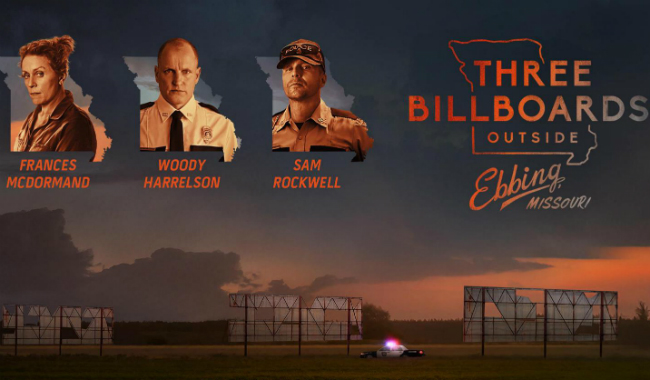Ebbing, Missouri is a lot like Cicely, Alaska, the setting
of the 1990s TV show Northern Exposure.
Both are small fictional towns filled with quirky individuals from a variety of
backgrounds who all seem to know each other, and despite lacking formal
education can summon culture and wisdom at odd times. Both, in their own ways, represent
visions of American society. But whereas Cicely was a vision of Clinton-era
America, where differences are celebrated and even the bigot and the homophobe can
find a welcome, Ebbing is a vision of Trump-era America where differences are
mocked and punished, and the racists and homophobes are in charge. If the
former viewed America through rose-colored glasses, the latter shows it as in a
fun-house mirror, full of bizarre and horrific distortions.
Ebbing, of course, is the setting for the Indie-darling film
Three Billboards outside Ebbing, Missouri,
which won the Golden Globe for best dramatic film, along with acting awards for
lead actress Frances McDormand and supporting actor Sam Rockwell. It has been
nominated for seven Oscars, including Best Picture.
McDormand plays Mildred Hayes, the grieving mother of a
teenage daughter who had been raped and murdered seven months earlier. The
local police department, headed by police chief Bill Willoughby (Woody
Harrelson) and his dim-witted racist deputy Jason Dixon (Rockwell) have
apparently been too busy harassing the African-Americans in town to investigate
the crime. Dixon is Barney Fife to Willoughby’s Andy Taylor, with the same
thinly veiled but deeply repressed homosexuality, which in Dixon’s case emerges
in violent eruptions towards the towns gay advertising company owner and the
African-Americans in his custody.
Hayes, a domestic abuse survivor and single mother, sponsors
messages on three billboards accusing Willoughby of dragging his feet on the
investigation. The billboards attract media attention and divide the community –
most people siding with the police chief. But Hayes has the support of a company of
outcasts – the gay billboard owner, two African-Americans, and the local dwarf
with unrequited affection for Hayes. A series of melodramatic twists ensue,
with escalating violence, with an ending that serves more as a Rorschach test
than a resolution.
Ebbing is supposedly in the Ozarks of southern Missouri,
where ignorant, poor white folk get their jollies harassing those who are “different.”
But the film is all caricature rather than character, unlike the far superior
2010 film Winter’s Bone, set in the
same locale. Sometimes the caricatures are played for cheap laughs (“It’s no
longer n****r torture, it’s ‘people-of-color torture’”); sometimes it is played
straight. But it’s always *played*. Events coincide too conveniently; there is
violence but never accountability, and the offenders are given all-too-easy
reconciliation. There is pseudo-wisdom (“anger only begets more anger”) and shallow
theology – together with an ineffectual priest and cheap shots at organized
religion.
The Oscar-nominated screenplay is by British writer-director
Martin McDonagh (In Bruges), but
rather than providing the insight of an outsider’s view of our society, it relies
on caricature and lacks a true sense of place or regional culture. Despite having
a realistic tone, it represents a Hollywood understanding of race and class in rural
America, which may be why Hollywood has given it high praise. Like Trump’s own vision of America, it is a manufactured truth designed for emotional impact rather than
something showing genuine understanding.
That having been said, the film has snappy dialogue, is
well-paced, and has some of the best acting of any film this year, notably by
the Oscar-nominated McDormand, Rockwell, and Harrelson, whose performances make
the film worthy of seeing. It’s enjoyable in the same way as dining at Taco
Bell and Panda Express – the food is mostly empty calories, but it’s tasty so
long as you don’t mistake it for the real cuisine. Some critics call it “Coen
Brothers lite.” I tend to agree.
2.5 stars out of 4.0. Rated R for excessive profanity, and some violence and gore.

